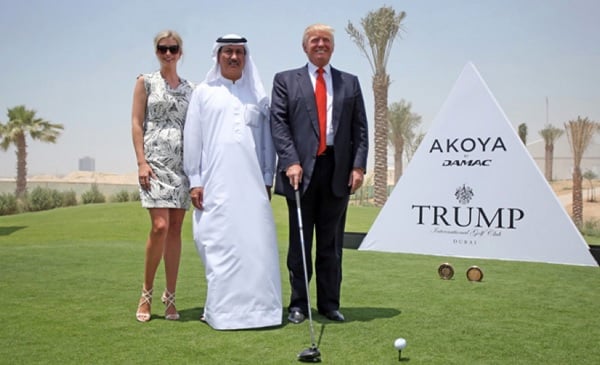
Donald and Ivanka Trump with Dubai partner Hussain Sajwani
President Donald J. Trump’s global conflict-of-interest problems just got a little bit bigger. As McClatchy DC reports in detail, Trump and a Dubai property development partner have hired a shady Chinese government construction firm to build a part of the Trump International Golf Club Dubai in the United Arab Emirates (UAE). This news comes “despite a pledge from Donald Trump that his family business would not engage in any transactions with foreign government entities while he serves as president.”
Trump’s partner in Dubai is DAMAC Properties (داماك), headed by billionaire Emirati property developer Hussain Sajwani (حسين سجواني), pictured above with Donald and Ivanka Trump. Sajwani has been called the “The Donald of Dubai,” and has raised conflict-of-interest concerns among Trump’s critics by openly trading off of his relationship with the U.S. president. The Chinese firm in question is majority state-owned China State Construction Engineering Corporation (CSCEC, 中国建筑工程总公司), awarded a $32 million road construction contract for the “AKOYA Oxygen” residential portion of the Trump Dubai project, where residential units will be priced up into the millions of U.S. dollars.
CSCEC is clearly a Chinese Communist Party-led organization: CSCEC chairman Guan Qing (官庆) doubles as the company’s party secretary. CSCEC president and general manager Wang Xiangming (王祥明) likewise doubles as the company’s deputy party secretary. CSCEC’s deputy general managers are also party members. As in other Chinese state-run organizations, CSCEC staff regularly take part in mandatory Communist Party political education and party-building programs. The party’s objectives differ sharply from U.S. policy goals in the “Greater China” and Asia-Pacific region.
Trump’s Dubai golf venture presents possible overseas conflicts of interest on two fronts: One with the UAE’s “Donald of Dubai,” and the other with China’s corrupt one-party dictatorship. As The Atlantic observes, “Trump’s relationship with Sajwani certainly creates the impression that this venture could give special benefits to the Emirati businessman and, by extension, other investors who have Sajwani’s ear.” Moreover, Trump “will be profiting from business interests [in the UAE that] could jeopardize his ability to make objective and effective decisions about policy that will affect the U.S., the UAE, and the Middle East overall.”
As McClatchy further observes, China’s state-run CSCEC “was one of several [Chinese companies] accused by the World Bank of corruption for its role in the bidding process for a roads project in the Philippines and banned in 2009 from World Bank-financed contracts for several years.” CSCEC also appears in documents from the notorious Panama Papers leak, drawing scrutiny for possible tax evasion and/or money laundering. For the President of the United States to be entangled with such a firm raises obvious concerns.
The Trump-Kushner family’s Chinese conflicts of interest have been previously noted, including valuable Chinese trademarks for Trump businesses, manufacturing in Chinese sweatshops for Ivanka Trump fashion products, and Chinese investment in Trump-Kushner real estate projects from the controversial EB-5 “visa-for-sale” scheme for wealthy investors. Any of these dealings could influence Trump administration policy decisions with regard to China.
Trump business ventures abroad also come at significant cost to taxpayers: When Trump’s sons Eric and Donald Jr. traveled to Dubai for a February 2017 ribbon-cutting ceremony at the Trump International Golf Club, the Secret Service shelled out nearly $17,000 for agents’ hotel bills alone (Add this to the nearly $100,000 the Secret Service spent on hotel bills for Eric Trump’s business trip to Uruguay in January, the more than $50,000 for Eric and Tiffany Trump’s business trip to Vancouver in February, and the many other taxpayer-funded business and pleasure expenses for the most costly First Family in U.S. history).
American voters might wish to consider all of this very carefully before deciding ever again that a “businessman president” is what America needs most.